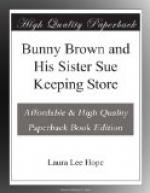“Here are some old baseball things,” said Mr. Morrison. “I got them in a lot of junk I bought a year ago, and I’ve been wondering what to do with them. I like the way you boys acted—especially some of you,” and he looked at Bunny. “I’m going to let you have these things for your team,” he said. “But try not to break any more of my windows!” he laughed.
“We won’t!” promised Bunny Brown. “Or, if we do, we’ll pay for ’em!”
“Crackie! What dandy stuff!” cried Bobbie Boomer.
“Now we can have regular league games!” exclaimed Charlie Star, who was perhaps the best player of all the boys.
“And a real mask, like the Pirates have!” cried Harry Bentley.
“Take ’em along,” said Mr. Morrison. “They’re only cluttering up my cellar. I’m glad to get rid of ’em, and especially to good boys.”
“We—we were afraid of you at first,” said Charlie.
“Well, you needn’t be any more,” chuckled Mr. Morrison. “Just pay for my window, when you get the money together, and we’ll call it square!”
Talking, laughing gleefully, and wondering at their good fortune, the boys hurried from the cellar. And they had another game that same afternoon, with the balls, bats, gloves and mask that Mr. Morrison had given them. Only Bunny knocked no more home runs, and Charlie’s team won, which was, perhaps, as it ought to be. And, best of all, no more windows were broken.
It was quite an adventure for Bunny Brown, but it was not the last he and his sister Sue were to have, for many good times were ahead of them for the long vacation.
CHAPTER XVI
LITTLE STOREKEEPERS
“Here, Bunny! Here, Sue!” called Mrs. Brown, one bright, sunny morning. “Where are you?”
“We’re coming, Mother!” answered Bunny.
He and his sister were playing in the yard down near the brook. Bunny had carried to the brook a little boat, and Sue had with her one of her very small dolls which was having a voyage on the small vessel. She had picked out a celluloid doll.
“’Cause then if she falls off into the water it won’t hurt if she gets wet,” said Sue.
“That’s right!” agreed Bunny.
But now the children left their play and ran to see what their mother wanted.
Before doing so, however, Bunny made fast the little boat to a tree on the bank of the brook, tying it by a long string. And Sue took the celluloid doll off the deck and laid her on the grass in the shade.
“’Cause she might go off sailing by herself,” Sue explained.
“Pooh! She couldn’t sail my boat!” laughed Bunny.
“Well, she might,” said Sue.
Then they ran to their mother—who was waiting for them on the back steps.
“What do you want, Mother?” asked Sue.
“Is it time to eat?” is what Bunny Brown asked. Bunny, like many children, was always ready for this.




